Green accommodations by the North Sea
Welcome to the North Sea, a destination where sustainability and natural beauty go hand in hand. In this guide, we will explore the green accommodatio...
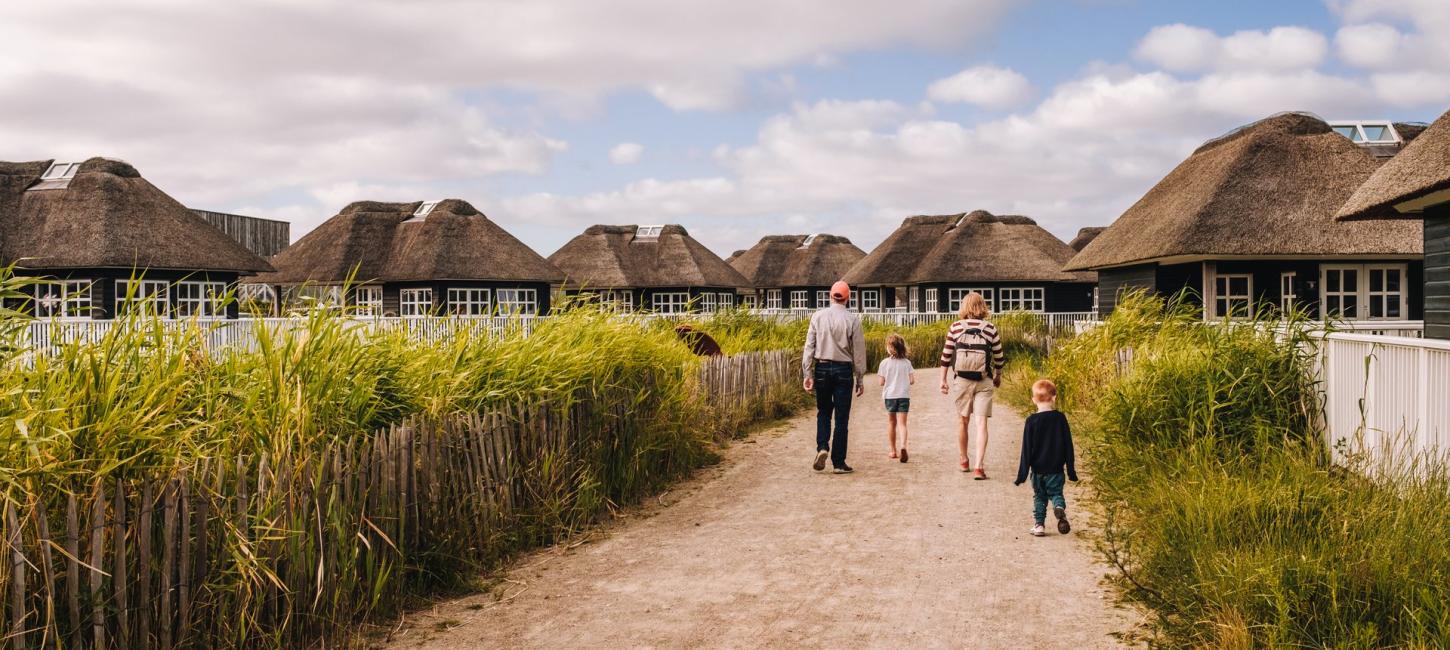
Explore green tourism in the North Sea with our guide. Learn how to plan eco-friendly holidays and support sustainable tourism.
Welcome to a world where travel meets sustainability - welcome to the North Sea. This fascinating region of Denmark is a paradise for ecotourism and green holidays, where visitors can enjoy the beauty of nature without compromising their environmental values. The North Sea, from Hvide Sande Nordstrand to Skallingen and Langli, opens up a world of opportunities to experience ecotourism in action.
Ecotourism in this region is not just a way of travelling; it is an embedded part of the experience. With its focus on environmental conservation and support for local communities, Vesterhavet invites travellers to participate in a form of travel that enriches both themselves and the areas they visit. Areas like Blåbjerg Plantation and Skjern Enge offer unique opportunities to explore and learn about the local flora and fauna while supporting conservation efforts.
Green tourism here goes hand in hand with the natural and cultural wealth of the region. With a range of sustainable accommodation options, from Henne Strand Camping to Fjordgaarden, there is no shortage of places to stay that respect and protect the environment. These places not only offer a place to rest, but also opportunities to engage in green activities such as sustainable hiking, bird watching and water sports.
Green holidays by the North Sea are about more than just enjoying the breathtaking scenery; it's about travelling with care. By choosing activities and accommodation that promote sustainability, you actively contribute to preserving the area's unique environment and support tourism that is responsible and sustainable.
So whether your journey takes you to the soft sandy beaches of Vejers Strand or the lush natural areas of Ho Klitplantage, North Sea promises an eco-friendly holiday experience that is both memorable and meaningful.
When planning a green holiday to the North Sea, there are several aspects to consider to ensure your trip is as environmentally friendly and sustainable as possible. Here are some tips on how you can plan a holiday that respects nature and supports local communities.
Choose sustainable accommodation
Start by finding accommodation that prioritises sustainability. Look for hotels, B&Bs or campsites that have sustainable certifications or are known for their green initiatives. Places like Henne Strand Camping and Esmark holiday homes are good examples as they often use renewable energy, recyclable materials and offer local organic food.
Transport options
Consider how to get to and around the North Sea. If possible, choose public transport such as trains or buses, which have a lower environmental impact than driving or flying. Once at your destination, consider using bikes or walking, especially when exploring natural areas like Blåbjerg Plantage or coastlines like Nymindegab Strand.
Local activities and attractions
Plan activities that have minimal impact on the environment and support the local community. This could include guided nature walks, bike rides, bird watching or visits to attractions like Naturkraft. These activities not only provide insight into the natural and cultural beauties of the region, but also support sustainable tourism.
Eat local and organic
Choose to eat at restaurants that use local and organic ingredients. Places like Restaurant Fjordgaarden and Hr. Skov are known for their commitment to local ingredients, which supports local farmers and reduces the carbon footprint of food.
Minimise your footprint
Be conscious of your environmental footprint during your stay. This includes minimising waste, recycling, conserving water and energy, and avoiding disturbance of natural habitats. Every small action can make a big difference in preserving the beauty of the North Sea. Also the 8 commandments of the North Sea.
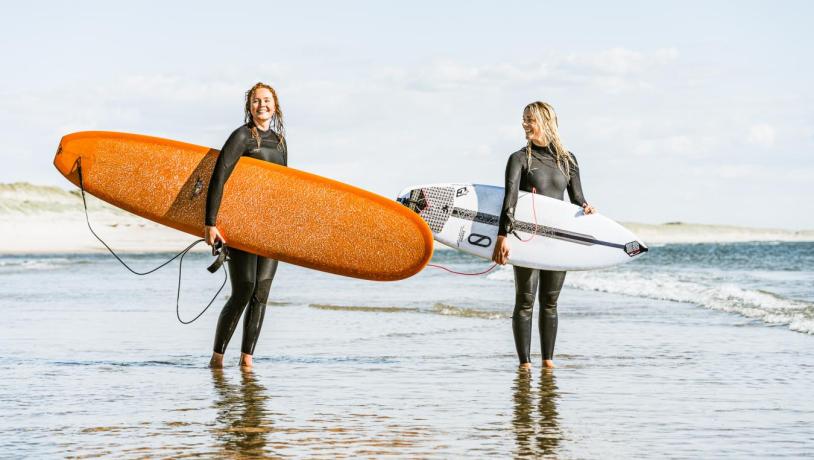
Photo:VisitVesterhavet
When you choose to spend your holiday in a green and sustainable way by the North Sea, you not only contribute to environmental protection, but also gain a number of benefits that enrich your holiday experience.
Positive environmental impact
The most immediate benefit of green holidays is the positive effect on the environment. By choosing sustainable accommodation, minimising the environmental impact of transport and participating in eco-friendly activities, you reduce your carbon footprint. This contributes to the preservation of the region's natural areas, such as Skjern Enge and Filsø, safeguarding biodiversity and protecting natural habitats.
Enhanced travel experience
Green holidays by the North Sea offer a more authentic and enriching travel experience. You get the opportunity to immerse yourself in the local environment, experience nature up close and learn about the region's unique ecosystems. This creates a deeper connection to the place and a more memorable experience.
Supporting the local community
By choosing green holidays, you're also supporting local economies. Using local services, staying overnight at places like Henne Strand Camping, and dining at local restaurants like Restaurant GRO contribute to local businesses and help keep culture and traditions alive.
Personalised wellbeing
Green holidays also contribute to your personal wellbeing. Surrounded by nature, with opportunities for outdoor activities and relaxation away from the bustle of the city, you can improve your physical and mental health. The fresh air, tranquillity and natural beauty of the North Sea provide a perfect setting for relaxation and renewal.
Education and awareness
Finally, green holidays offer an educational component. Through activities that promote sustainability and interaction with local experts, your understanding of environmental challenges and solutions will expand. This knowledge can enrich your life and inspire sustainable choices even after your holiday.
Choosing a green holiday by the North Sea therefore means not only taking responsibility for the environment, but also enriching your own travel experience in many meaningful ways.

Photo:Arnbjerg Pavillonen
When travelling to the North Sea, it's not only the scenic surroundings that make the experience special, but also the interaction with the local community. Responsible tourism is about creating positive connections between visitors and locals, and it starts with respect and understanding.
To ensure responsible interaction with the local community, it's important to approach with an open and respectful attitude. This means listening to and learning from locals, understanding their culture and traditions, and respecting their way of life. This can involve anything from following local customs to avoiding disrupting the daily rhythm of small communities.
Supporting the local community is also a key part of sustainable tourism. This can be done by eating at local restaurants such as Restaurant GRO and Henne Kirkeby Kro, where you can enjoy dishes made from locally grown ingredients. Shopping in local shops and markets where you can find handmade goods and handicrafts is another way to contribute economically to the community.
Another important aspect of responsible tourism is participating in cultural activities or events that celebrate and preserve local life. This can be anything from attending a festival to visiting a local museum or art gallery. These experiences not only provide deeper insight into the culture of the area, but also support the preservation of the community's heritage.
By following these guidelines, you can ensure that your visit to the North Sea is enriching for both you and the local communities you interact with. It's about giving back and creating positive, lasting connections that contribute to the region's sustainable development.
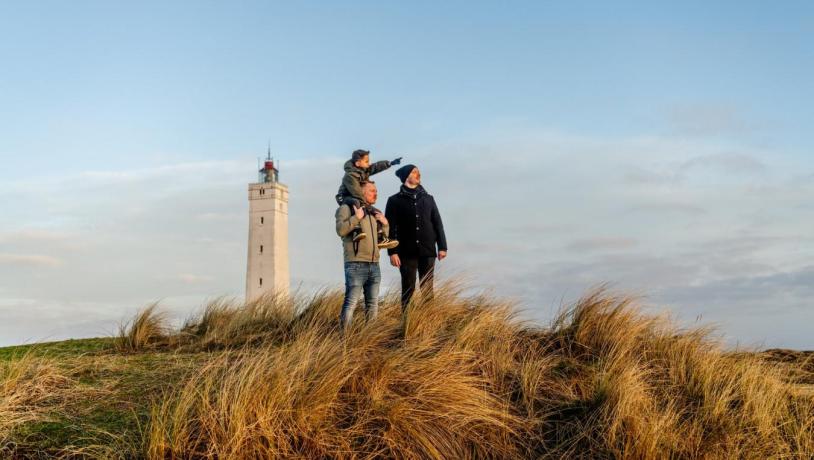
Photo:Mette Johnsen
An integral part of sustainable travel behaviour is to practice sustainable consumption during your stay in the North Sea. This includes everything from reducing your plastic consumption to supporting local businesses, all of which contribute to preserving the region's unique environment and cultural identity.
Reducing plastic consumption is especially important in a natural area like the North Sea. This can be done by bringing reusable water bottles, cloth shopping bags, and avoiding single-use plastics such as straws and cutlery. These small changes in your daily habits can have a significant impact on the environment by reducing waste and pollution.
Another important factor in sustainable consumption is supporting local businesses. When you buy local products and services, you are directly contributing to the local economy and helping to preserve cultural heritage. This can include everything from buying crafts and goods from local artists to choosing local food at markets or restaurants. By eating at places like Restaurant GRO, which emphasises local ingredients, you're also supporting sustainable farming practices.
Furthermore, it's important to consider the environmental impact of your purchases. Choose products that are sustainably produced and consider whether you really need what you're buying. Less consumption and more conscious purchasing are key elements in reducing your environmental footprint.
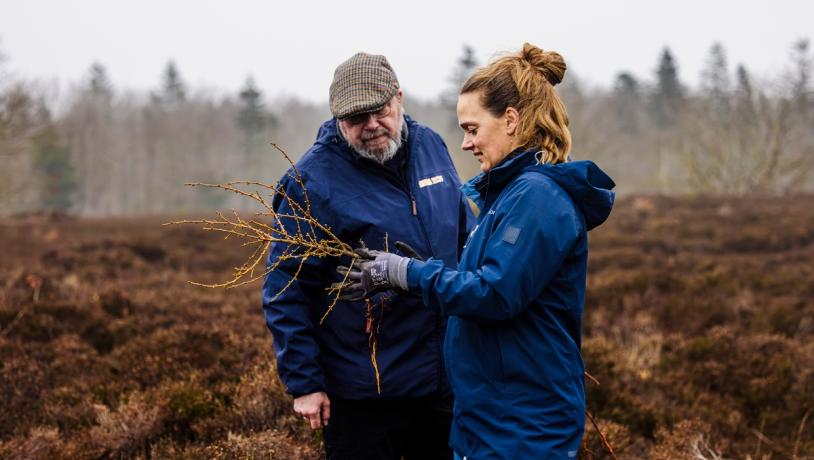
Photo:Sarah Rønholt
When you visit the North Sea, you enter an area of breathtaking natural beauty and sensitive ecosystems. To ensure that these treasures are preserved for future generations, it is important to follow the principles of 'leave no trace'. This concept is about minimising your environmental impact and ensuring that nature remains untouched by your visit.
One of the most basic practices is to leave natural areas as you found them. This means avoiding disturbing wildlife, plant growth, and natural landscapes. When hiking, stick to the marked trails to avoid erosion and damage to plants. If you come across litter that isn't yours, consider picking it up and disposing of it properly.
Reducing your waste is another important part of leaving no trace. This can be achieved by packing sustainably, bringing reusable containers and avoiding single-use plastics. Also, be mindful of your water and energy consumption as these resources are valuable, especially in natural areas.
Furthermore, when participating in outdoor activities such as camping or picnics, it's important to use environmentally friendly products and to thoroughly clean up after yourself. Don't leave food scraps or other rubbish behind as it can attract wildlife and disrupt the natural ecosystem.
Finally, when taking photos or memories home, ensure that the only thing you leave behind are footprints and the only thing you take are photos. This will ensure that the natural beauty and biodiversity of the North Sea is preserved for the future.
By following these simple but important guidelines, you are helping to protect and preserve the unique nature of the North Sea for both current and future visitors. Your commitment to leave no trace is an expression of respect for nature and a conscious effort to ensure its continued beauty and viability.
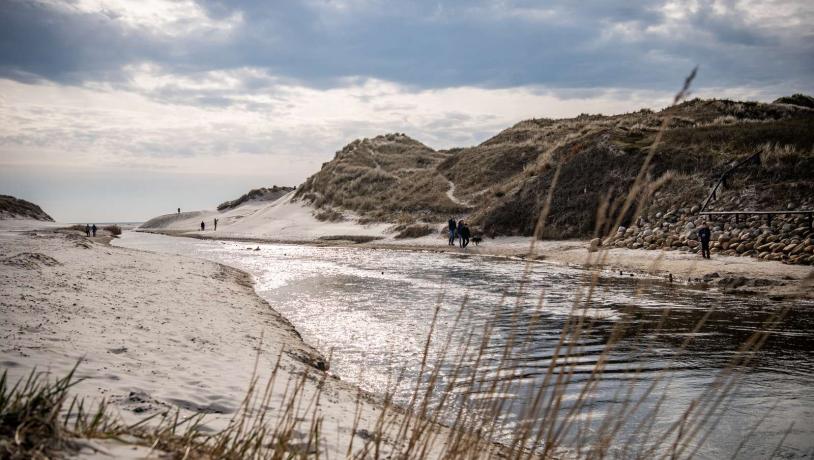
Photo:VisitVesterhavet
To further enrich your trip to the North Sea and ensure you practice sustainable tourism, it's a good idea to equip yourself with additional resources and information. Below you will find a list of useful links and organisations that can give you deeper insights and help you make informed choices during your visit.
Naturpark Vesterhavet - The official website of Naturpark Vesterhavet provides information about the area's nature, cultural history and the many recreational opportunities.
Den Danske Naturfond - For those interested in in-depth information about nature conservation and sustainable initiatives in Denmark.
Green Key - An international environmental certification that helps you find environmentally certified hotels and attractions in the North Sea.
Danish Environmental Protection Agency - Offers information on sustainability practices and nature conservation in Denmark, which can be useful for environmentally conscious travellers.
Danish Ornithological Society - Perfect for birdwatchers or nature lovers who want to learn more about local birdlife and participate in birdwatching tours.